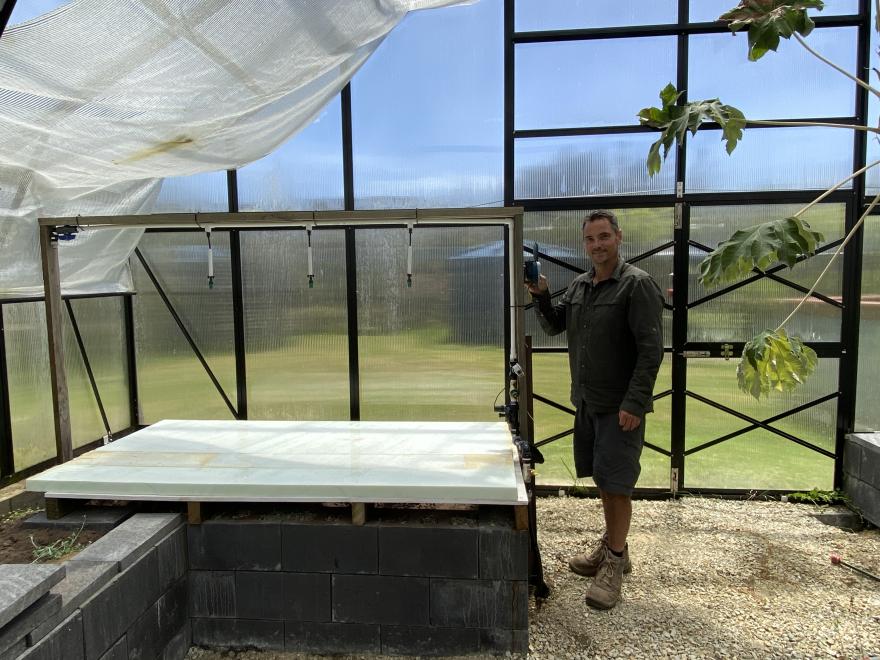Filter Categories
All AustralianTours
Garden News
General News
Information
Sort By Title
The project is funded by Botanic Gardens Conservation International (BGCI) in 2021 as part of an initiative in partnership with ArbNet.
This project is a collaboration with Bedgebury National Pinetum and Forest in England who are currently working on the conservation of this species with the Mulanje Mountain Conservation Trust and the Forestry Research Institute of Malawi. The aim of this project is to grow specimens to reproductive age and harvest the seed for distribution to other institutions in Australia and hopefully eventually back to Malawi.

The genus Widdringtonia is an African genus of the Southern Cypress family (Cupressaceae: Callitroideae) comprised of 4 species (W. nodiflora, N. schwarzii, N. wallichii (formerly W. cedarbegensis) and W. whytei. Their closest relatives are the Australian Callitris and Actinostrobus. We are successfully growing two of these 4 species here in the Inala Jurassic Garden (W. schwarzii and W. wallichii), both of which are now producing both male and female cones.
In 2019, Dan Luscombe, Collections Manager for Bedgebury National Pinetum and Forest (Kent, UK) was visiting Australia and called into the Inala Jurassic Gardens. Dan was instrumental in designing nursery trials to propagate and grow and re-forest areas of another critically endangered Widdringtonia species, the Mulanje Cedar (W. whytei) which is endemic to Malawi, Africa as part of a Darwin Initiative Award program through Botanic Gardens Conservation International (BGCI) and two Malawi-based Conservation and Forestry Trusts. While the Bedgebury team was able to germinate the seed, the seedlings could not be grown successfully because of the climate conditions in the UK. It is believed that this species is now functionally extinct in the wild, with no remaining cone-bearing plants from which to obtain more seed, so the race is on to save the species from extinction before the germination rate of the stored seed falls below viable limits.
Dan was very interested and excited to see how successfully our two Widdringtonia species were growing in the Jurassic Garden and asked if we would be interested in receiving some of Bedgebury’s stored W. whytei seed to undertake germination trials and grow insurance specimens as a collaborative project. Imagine our delight at being given this amazing opportunity to collaborate with such a major botanic institution on such an important project! Because of Australia’s very strict biosecurity measures, we understandably couldn’t just bring seed into Australia without the appropriate permits and biosecurity procedures, and because of its rarity, W. whytei is not a recognised species on Australia’s plant import register, so we had to start from first principles to register the species and gain authorisation to import the seed with Biosecurity Australia. This has been a long, complicated process which has been further complicated by Covid restrictions, but we have persevered knowing the germination rate of the seed is lessening every year.
Our application was successful and are currently in the process of completing the permits required for Bedgebury to provide the appropriate phytosanitary certificates to import the seed. As part of this process, Inala Jurassic Garden has also successfully registered as a Seed Importer (Tasmania) via Biodiversity Tasmania. In further breaking news, we have just been advised that our application for financial assistance through a BGCI/ArbNet Partnership Programme Grant to collaboratively work with Bedgebury on this project was successful. We will provide updates on the project throughout the year as we reach major milestones, with the end result hopefully producing insurance specimens of this incredibly rare species and planting them in the Garden.

Smith, P. (2015): Saving Malawi’s National Tree: BGjournal , Vol. 12, No. 2, pp. 34-36. Published by: Botanic Gardens Conservation International (BGCI) [to read, right click and select 'Open in new tab']
Bayliss J., Makungwa S., Hecht J., Nangoma D., and Bruessow C.(2007): Saving the Island in the Sky: the plight of the Mount Mulanje cedar Widdringtonia whytei in Malawi. Oryx Vol. 41 (1) pp 64-69.
Mitrani, L.M. (2017): Reproduction and Establishment of Two Endangered African Cedars, Widdringtonia cedarbergensis and Widdringtonia whytei. Masters Thesis
Inala Nature
320 Cloudy Bay Road, Lunawanna
South Bruny Island 7150
Tasmania, Australia
Travel Vault policy certificate number:
EV2203UKFI0166
Phone: +61 3 6293 1217
Inala Nature acknowledge and pay respects to the palawa people as the traditional and original owners, and continuing custodians of this land, lutruwita, and acknowledges Elders - past and present. Inala Nature Tours and the Inala Foundation Inc are located on lunawanna- alonnah, also known as Bruny Island, the traditional land of the Nuenonne people.